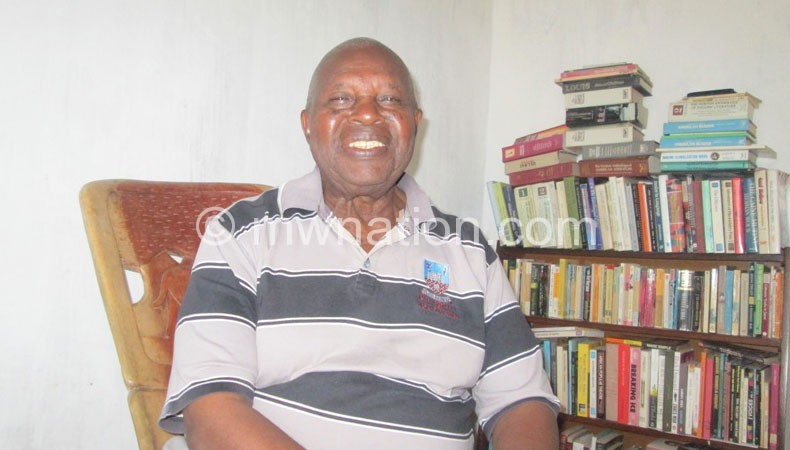A time to remember

Peeping into Professor Felix Mnthali’s yet-to-be published memoir A Time to Remember reveals life of a poet, writer and academician reflecting Malawian history from colonialism, state of emergency, Cabinet Crisis to the present multiparty dispensation. JOHN CHIRWA peeks into the manuscript.
“We struck the blow and died. The blow boomeranged, badly,” says Mnthali in the first chapter (Dedza Crisis) of the autobiography, coining an expression from John Chilembwe’s words during the 1915 uprising against British colonial rule in the country.
But the 1958 ‘Dedza Crisis,’ when Mnthali was only 25 years old at Dedza Secondary School, goes beyond Chilembwe’s words, to “strike a blow and die.”
The students lived the words by revolting against the placement of a teacher at the school who they perceived to be a spy planted by the colonial government.
“Following this incident, the school was closed and the whole student body was expelled,” says Mnthali.
Just as Albert Mtungambera Harawa, a lecturer in literature at Mzuzu University, argued recently in Mzuzu after Mnthali read the chapter at a forum for artists, the ‘Dedza Crisis’ is a direct revolt against the colonial government.
Noted Harawa: “The manuscript paints a picture of disillusionment with colonialism. The characters, including the narrator himself, are discontent with colonialism.”
In the next chapter, State of Emergency, Mnthali delights in the Dedza incident because it had given him an opportunity to take part in the 1959 State of Emergency.
He writes: “After being expelled from Dedza, I picked up a teaching job at Karonga Secondary School [now Chaminade]. My job in Karonga coincided with the State of Emergency. It was interesting to take part in the acts of defiance against the British government.”
This is the period when the then governor of Nyasaland, Sir Robert Armitage, declared a nationwide State of Emergency on March 3 1959 after persistent resentment against the Central African Federation.
“We have, however, to give credit to Dr Kamuzu Banda because he galvanised a lot of support countrywide against the colonialists. In his own words he said ‘If this is subversion, if this is treason, if this is anything against the Queen, arrest me here and now.’ It was such a moving oratory and it moved the country,” says Mnthali, who left Karonga in 1960 for Pius XII College [now National University of Lesotho] where the Catholic missionaries sponsored his undergraduate studies.
In 1963, he graduated with a degree in English and History, and the following year, he proceeded for postgraduate studies at the University of Alberta in Canada.
At the University of Lesotho, Mnthali says he repeated first year due to his devotion to unionism.
“I was in almost every committee. I was elected as the chairperson for the students’ union body twice and chaired numerous committees,” he says.
But the spirit of unionism he acquired in Lesotho helped reform the University of Malawi (Unima) in 1969 where he acquired a teaching job after graduating from Alberta.
“The university was dominated by the British. Louis Mughogho and I protested against this and the authorities granted us an opportunity to write a paper on the localisation of Unima.
“Our protests paid off because soon after we presented the paper, more locals were recruited and the position of pro vice-chancellor was created to accommodate local staff members,” explains Mnthali, who was the first Malawian to occupy the post.
1976 remains etched on his memory as he describes it as “a test of hell” in his manuscript.
But he remains uncomfortable to discuss the events surrounding his arrest in detail.
“Nobody knows why I was arrested. There were many accusations, but most of them were false. I have never really come to a conclusion on why I was detained,” he says about his four month-detention at Zomba Maximum Prison during Kamuzu’s regime.
“But during those days at Unima, we had really allowed tribalism to enter the university. A lot of people were being detained for their tribe,” he says, while promising that more details can be read from the autobiography when it is published.
The manuscript, which he says cannot be shared until is it published, is presently with Bright Malopa’s Rivonia Media Group who will work with Jhango Publishers.
“But I am not sure when it will be published. Perhaps in a year or two,” he said.
After his release from prison, Mnthali was the visiting fellow at the University of Ibadan, Nigeria between 1979 and 1980.
He then moved to the University of Botswana in 1982 as professor of English up until 2010. He headed the English Department for 14 years.
“I had a very good life in Botswana. I have been all over the world to read my poetry. I managed to educate all of my five children up to degree level and managed to build a big house for retirement,” he says, referring to a modern house he has built at Chimaliro in the suburbs of Mzuzu.
Now 81, Mnthali has been published several times including a 1982 collection of poems When Sunset Comes to Sapitwa and a 1998 English novel Yoranivyoto.
He is also searching for publishers for his two other novels, Free at Last and Women in Power.
Mnthali hails from Mlowe, Traditional Authority Mwamlowe in Rumphi.





